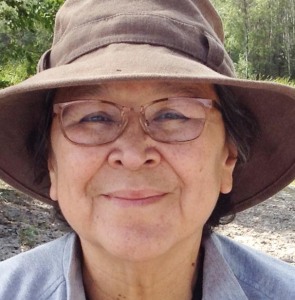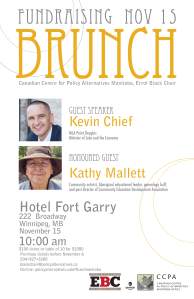By Jamie Brownlee and Kevin Walby
Under Canadian law, every citizen has the right to request information from federal, provincial/territorial, and municipal governments. Gaining access to tightly controlled government information is critical in promoting social justice.
Kathy Mallett is being honoured at this year’s CCPA-MB Errol Black Chair Fundraising Brunch being held November 15 at the Hotel Fort Garry.
There are unsung heroes in Winnipeg’s inner city, especially in the Aboriginal community, and few of them have a list of accomplishments as long and as significant as does Kathy Mallett. Winnipeg’s inner city today is an exciting place, bursting with positive change. Kathy Mallett has been a key person in laying the foundations for these changes.
By Josh Brandon
For Winnipeg residents with low incomes, the lack of affordable quality housing is a crisis. According to the 2011 National Housing Survey, 34,000 Winnipeg renters paid more than 30 percent of their income in rent, while thousands more lived in housing that was overcrowded or in poor condition.
Women have a lot at stake in this election: higher rates of economic inequality, impacts of violence and lack of child care. Here’s how Winnipeg women fare, and what the major federal parties have said they will do.
A recent study The Best and Worst Cities to be a Woman in Canada found that Winnipeg ranks low as a good place for women to live – the 18th out of 25 major Canadian cities. One of the key factors for this ranking is the income inequality faced by women. The wage gap in Winnipeg is higher than average: women working full time full year earn 76% of what men earn. Winnipeg’s women’s poverty levels exceed the national average by 4% and women are more likely than men to live in poverty. These rates are worse for Aboriginal and newcomer women, and women with disabilities.
By Shaun Loney
The energy strategy debate thus far in the federal election has focussed on the future of the oil sands and pipeline politics. The Federal Tories have trumpeted the economic benefits of oil sands development but the benefits are paltry compared to a comprehensive energy and water retrofit program focussed on low income Canadians.
November 15, 2015
Guest Speaker
Kevin Chief
MLA Point Douglas
Minister of Jobs and the Economy
Honoured Guest
Kathy Mallett
Community activist, Aboriginal educational leader, genealogy buff,
and past director of Community Education Development Association
Hotel Fort Garry
222 Broadway
Winnipeg, MB
November 15, 10:00 am
$100 ticket or table of 10 for $1000
Purchase tickets before November 6
204•927•3200
blackchair@policyalternatives.ca
On-line
By Jim Silver
If you’re following the federal election campaign you would think that poverty in Canada has been eliminated. Politicians, guided by their ever-cautious advisors and thinking only of short-term electoral advantage, rarely if ever utter the word, and creative anti-poverty strategies are largely absent from electoral platforms.
Looking for progressive responses to the newly signed Trans-Pacific trade deal? Here’s the latest from CCPA National:
Trans Pacific Commentary a Big Win for Corporate Interests
https://www.policyalternatives.ca/publications/commentary/should-canada-be-completing-trade-deal-middle-election
Should Canada be completing a trade deal in the middle of an election
https://www.policyalternatives.ca/publications/commentary/should-canada-be-completing-trade-deal-middle-election
CCPA-MB congratulates
Shauna MacKinnon in the launching of her new book Decolonizing Employment, Aboriginal inclusion in Canada’s labour market
October 7th, 7pm at McNally Robinson. All are invited.
“A cogent, well-documented critique of neoliberal labour market policy and how it impacts Indigenous peoples in Canada. This book points out the implications of ideologically motivated policy which ignores the impacts of colonization. MacKinnon challenges some of the accepted norms of neoliberal policy, with well-researched and compelling arguments for substantial policy reform.”
– Gayle Broad, Associate Professor, Department of Community Development and Social Work, Algoma University
Shauna MacKinnon is assistant professor in the Department of Urban and Inner City Studies at the University of Winnipeg, and a CCPA-MB Research Associate.
By Elizabeth Comack, Cara Fabre and Shanise Burgher
Crime rates in Canada have been steadily declining for more than a decade, yet prison populations have been increasing in recent years. Commentators have attributed this disconnection between dropping crime rates and rising incarceration numbers to the Harper government’s tough on crime strategy. Since 2006 the Harper Conservatives have implemented legislative and policy changes designed to “tackle crime” and “make communities safer.”







Follow us!